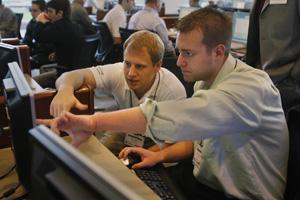Students face off in inaugural Tulane Energy Trading Competition
Twenty-eight of the nation's best student traders met up in New Orleans on Nov. 14 to test their skills trading simulated live oil and gas futures, but unlike most competitions, the winners of this event weren't necessarily the ones with the biggest profits.

The Tulane Energy Trading Competition was the first university trading competition to reward participants for using strategies to minimize risk. While other competitions award prizes based solely on profits, the Tulane Energy Trading Competition used a method for measuring risk---the so-called Ulcer Index---to penalize students who took on too much risk. Serving as judges were executives from top energy and trading firms, who quizzed students on their strategies and watched closely as they executed their trades.
"The idea was to create a trading competition that is more aligned with what employers want in the marketplace," says Joe LeBlanc, assistant director of the Tulane Energy Institute and organizer of the competition. "We think that by adjusting for risk, combining several different performance measures and using the best trading software from Trading Technologies and Thomson Reuters, we're creating a competition that rewards responsible trading and more accurately reflects the way trading is truly practiced in today's energy firms."
Aneal Tenjarla of the University of Texas at Austin won first place in the competition, Stephen Cacioppo of the Freeman School came in second, and Matt Gitelis of the University of Illinois took third place. The Freeman School's Kellen Hayes and Carnegie Mellon's Alexander Kirov placed fourth and fifth respectively. Top winners could choose between a cash prize and internships with trading firms such as Webster Capital, Mirant Corp. and TXU/Luminant.
Tenjarla said the contest was a great opportunity to learn trading strategy from industry insiders in a realistic environment that felt like an energy trading firm.
"This is probably the closest thing you can get to actually trading besides committing actual value and risking actual money," says Tenjarla, who plans to work as a financial analyst after graduation. "Before this competition, I really didn't know much about different trading strategies, different patterns of trading or how to use this technology. By the end of this, I felt like I got a good education."
"I think what most impressed me was the realism and the fact that the competition was judged by experts in the industry," says Cacioppo, who won an internship with Webster Capital in Chicago for his performance. "They asked us questions about why we did what we did, and we were able to get some great feedback on strategy."

The event's judges gave the competition high marks for helping to teach students the importance of managing risk.
"They are trying to show people how to take risks properly and that there actually are downsides to how you approach trading," says Parker Drew, managing director of RBS Sempra Energy and a competition judge. "They are trying to make people have to make cogent risk decisions or what I call ‘skin in the game.'"
In addition to Drew, the competition featured judges from Mirant Corp., TXU/Luminant, Geneva Trading, Sequent Energy, Webster Capital, Aardvark Energy, ConocoPhillips, CitiGroup, Entergy Corp., Shell Trading, LIM, Johnson Rice and Goldman Sachs.
The competition took place in the Trading Center, the Freeman School's state-of-the-art electronic trading classroom. Participants used Trading Technologies' X_TRADER platform and Thomson Reuters' 3000xtra software, the same tools used by professional traders at leading energy firms.
"The bulk of energy trading activity has moved from the trading pits in New York and Chicago to computer screens," says Leo Murphy, university program manager with Trading Technologies, one of the event's sponsors. "For this reason, we felt it imperative to arm students with the same software that is used everyday by professional traders."
The 28 students who competed earned the right by participating in a team-based remote competition in October. Twenty-one teams from 13 business schools competed online over two weeks, using a mock $100,000 account to execute at least five trades per day. The top seven teams based on risk-adjusted return qualified to participate as individuals in New Orleans.
The Tulane Energy Trading Competition was presented by the Tulane Energy Institute and the Tulane Energy Club and sponsored by CME Group, Trading Technologies, Thomson Reuters and LIM. For more information about the competition, visit http://trading.tulane.edu.
Interested in advancing your education and/or career? Learn more about Freeman’s wide range of graduate and undergraduate programs. Find the right program for you.
Other Related Articles
- Politico: Trump administration moves closer to opening Venezuela to more US oil producers
- Alumna leverages Freeman network to land dream job at Entergy
- Quartz: What it would take for Trump to drag Big Oil back into Venezuela
- Harvard Business Review: Why AI Boosts Creativity for Some Employees but Not Others
- Forbes: How To Talk Politics With Family Over The Holiday
- AI-powered fund takes top prize in Aaron Selber Jr. Hedge Fund Course
- De Franco appointed Keehn Berry Chair of Banking and Finance
- The Wall Street Journal: For Trump, the Warner Megadeal Talks Are All About CNN
